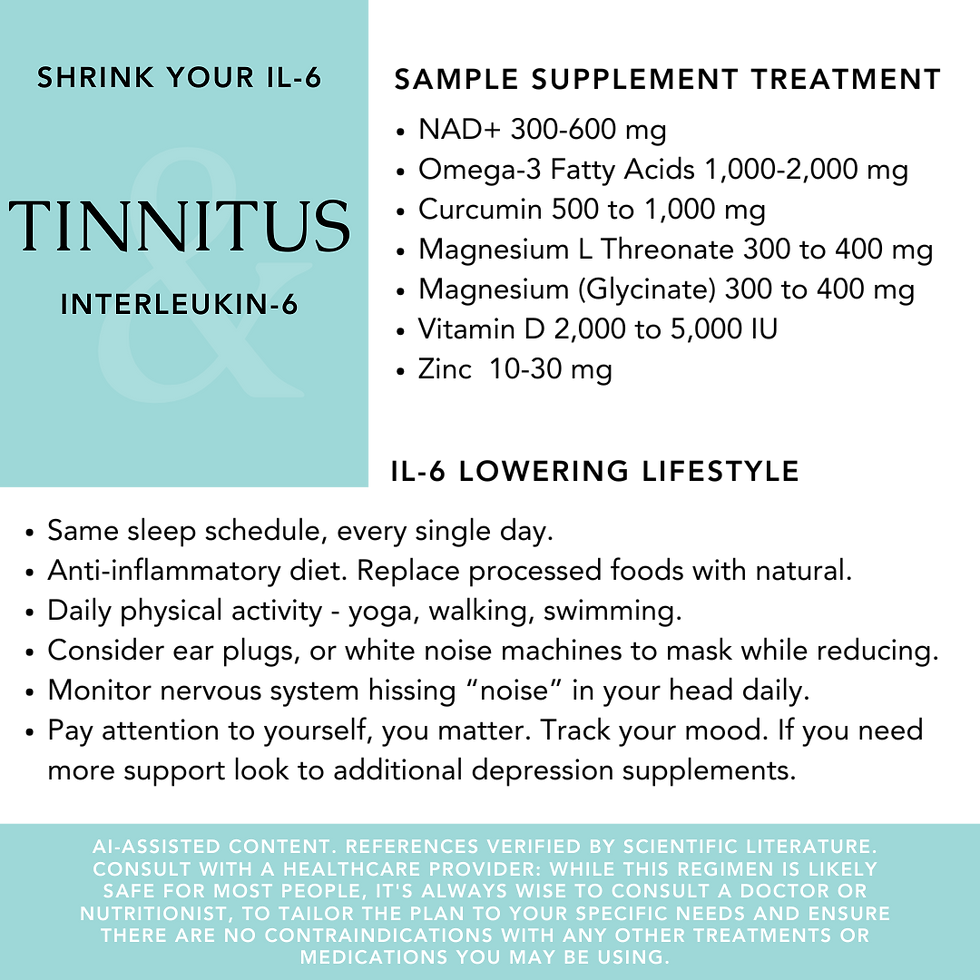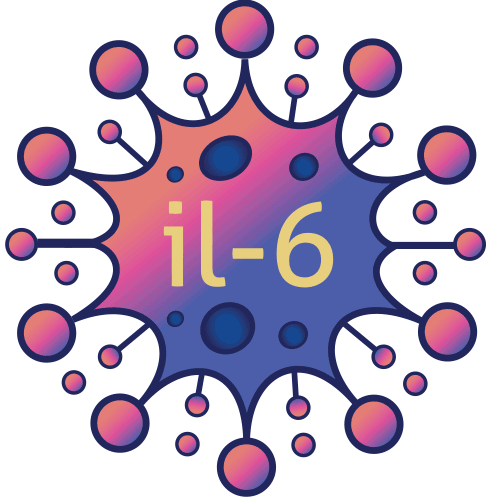Tinnitus (Ear Ringing): The Link to IL-6 Levels
- From The Mind of AI

- Nov 17, 2024
- 3 min read
Updated: Dec 30, 2024

Tinnitus, often referred to as ear ringing, buzzing or noise in the head, affects millions of people and can range from mild discomfort to a life-altering condition. Typically described as a ringing, buzzing, or hissing sound in the ears, though the sound can vary in intensity and frequency. Recent research suggests that inflammation, particularly elevated levels of IL-6, may play a role in the development and persistence of tinnitus.
What is IL-6?
Interleukin-6 (IL-6) is a cytokine involved in the body's immune response and plays a key role in inflammation. While IL-6 is essential for fighting infections and promoting tissue repair, chronic elevation of IL-6 can contribute to neuro-inflammation and damage to the auditory pathways. This inflammation may result in dysfunction within the auditory system, contributing to the perception of noise (tinnitus).
IL-6 and Tinnitus Research
Studies have indicated a link between elevated IL-6 levels and sensorineural hearing loss, a common cause of tinnitus. Neuro-inflammation, particularly involving IL-6, can disrupt the normal processing of sound in the auditory cortex and inner ear, leading to persistent tinnitus even in the absence of external sound stimuli. Inflammation-driven auditory damage, especially from noise exposure or autoimmune conditions, may also be exacerbated by high IL-6 levels.
Tinnitus, Noise in the Head, and Mental Health
Tinnitus is not solely an auditory condition; it often has significant impacts on mental health. Many individuals with tinnitus experience anxiety, depression, and insomnia due to the constant ringing or buzzing in their ears. These emotional and cognitive disturbances can worsen tinnitus, creating a cycle where stress and anxiety increase the perception of noise, and the worsening tinnitus heightens emotional distress.
Studies show that people with chronic tinnitus are more likely to develop mental health issues, including generalized anxiety disorder and major depressive disorder. The ongoing noise can lead to cognitive dysfunction, poor concentration, and disrupted sleep patterns, further affecting an individual's quality of life.
Supplements for Tinnitus Symptoms
Reducing IL-6 levels and managing neuro-inflammation in the auditory system may help alleviate tinnitus symptoms and improve mental health.
Supplement | Dosage | Benefits |
NAD+ (Nicotinamide Adenine Dinucleotide) | 300 mg to 600 mg per day | Supports cellular energy production, reduces neuro-inflammation in the auditory system, and protects against oxidative stress, potentially reducing tinnitus. |
Omega-3 Fatty Acids (EPA and DHA) | 1,000 mg to 2,000 mg per day | Reduces IL-6 levels, supports brain function, has anti-inflammatory properties, and may improve mental health and reduce the perception of tinnitus. |
Curcumin (Turmeric Extract) | 500 mg to 1,000 mg per day | Anti-inflammatory and antioxidant that reduces IL-6 levels and may lower inflammation in auditory pathways, reducing the perception of tinnitus. |
Magnesium | 300 mg to 400 mg per day | Supports nerve function, reduces IL-6 levels, and may decrease sensitivity to noise and tinnitus, improving sleep quality. |
Vitamin D | 2,000 IU to 5,000 IU per day | Regulates immune function, reduces IL-6 levels, and may improve auditory health by reducing inflammation and alleviating tinnitus symptoms. |
Zinc | 10 mg to 30 mg per day | Supports immune health, cellular repair, and modulates inflammation. Zinc deficiency has been linked to tinnitus, and supplementation may reduce its severity. |
Lifestyle Recommendations
Lifestyle Approach | Recommendations |
Anti-Inflammatory Diet | Rich in anti-inflammatory foods (vegetables, fruits, whole grains, omega-3s). Avoid processed foods, sugars, and unhealthy fats. |
Noise Management | Use ear protection in loud environments. Consider white noise machines to mask tinnitus. |
Stress Reduction | Practice stress reduction techniques like meditation, deep breathing, yoga. Consider CBT for psychological support. |
Adequate Sleep | Establish a regular sleep routine, address sleep disturbances like insomnia. Magnesium supplementation can aid in better sleep. |
Encouraging Thoughts on Treatment
By addressing inflammation, oxidative stress, and mental health factors, there is hope for managing the intensity and impact of tinnitus. Research into IL-6 and tinnitus provides promising avenues for treatment, as reducing IL-6 levels through supplements and lifestyle changes may alleviate both the auditory and emotional symptoms of tinnitus. Although there is no definitive cure for tinnitus, managing neuro-inflammation can improve quality of life and reduce the severity of symptoms.
By following this regimen, combined with lifestyle changes such as stress management, noise reduction, and an anti-inflammatory diet, individuals with tinnitus may experience reduced inflammation, improved auditory health, and a reduction in the severity of ear ringing. Regular follow-up with healthcare professionals is recommended to monitor progress and adjust treatment as needed.




Коментарі